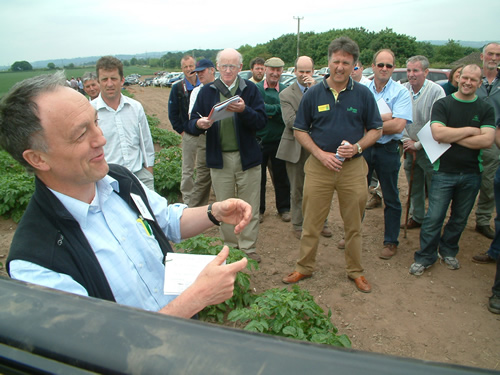
There are bright prospects for British potato growers to address global economic challenges and credible opportunities to save on fertiliser cost. Around 200 growers and specialists attended Potato Council’s West Midlands Potato Day on Wednesday, June 3, to discuss business and technical priorities with some of the country’s leading experts.
Potato Council’s summer meetings kicked off at Chasepool Farm, near Dudley, West Midlands. Sponsored by McCain Foods, Greenvale AP and the NFU, the day comprised formal presentations and field discussions, addressing a range of topical issues.
NFU deputy president and Pembrokeshire grower Meurig Raymond said British potato growers are well placed to address global economic challenges.
"The UN predicts the world population will rise from six to nine billion people by 2050. Potatoes are an extremely good value food source. They are highly nutritious, and an important source of carbohydrate and they will have a major role to play in feeding the world," said Mr Raymond, who grows 80 hectares (200 acres) of potatoes, packed and processed through Puffin Produce for ASDA.
"The challenge to produce the future global food requirement, while lowering the environmental footprint at the same time, is huge. Climatic change and reduced water availability will restrict many growing areas. But Britain, with its temperate climate, will be well placed to increase production.
"With the Government withdrawing research and development spending, Potato Council’s knowledge transfer role in helping British growers increase production, and lower their environmental impact will be crucial. The NFU values its close relationship with Potato Council and we look forward to working together at events to make sure we make the most of every opportunity for growers."
The morning business-focused papers were followed by afternoon technical workshops. Manure applications could be worth a staggering £450 per hectare at current fertiliser prices, according to ADAS consultant Ken Smith. Growers at the event were advised not to skimp on nutrients, but to adopt an integrated approach, making optimum use of available manures and nutrient alternatives, to feed a profitable crop.
"In the rotation it is usually the potato crop that is most responsive to phosphate (P) and potash (K) levels, so make sure these nutrients are not limiting," said Mr Smith. A 40t/ha application of farmyard manure (FYM) would typically provide 320kg/ha of potash – about the same as the off-take of a high yielding crop – and 140kg/ha of phosphate.
"But manure P availability is limited, at least in the short term, so it would still be worth topping up with fresh fertiliser P, even though P off-take for potatoes is a relatively modest 50kg/ha for a 50t/ha crop. The surplus P, and possibly K, can then give you scope for a break, or P and K holiday, perhaps for several following crops."
Fertiliser inputs represent the biggest single cost component for maincrop production, at around 18 per cent of total costs, so merit careful planning. Regular soil analysis, especially before a potato crop, is crucial to ensure nutrients are neither limiting nor wasted. "Make sure you are mindful of NVZ restrictions, and it is always worth testing manures for nitrogen content."
A LINK-funded project, coordinated by ADAS, aims to develop a new test based on a rapid scanning technique, to make manure analysis quicker and more accessible for growers.
The West Midlands event is the first of a number of key technical events taking place around the country this summer, pointed out Chris Steele, Potato Council’s water, soil and energy specialist.
"Feedback suggests the Potato Council summer events are now an established route for growers, agronomists and farm managers to gather key technical updates from the nation’s top experts. It’s not just a day out from your business, it’s an essential part of your business," he said.
